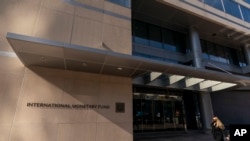Abebe Aemro Selassie, director of the IMF’s Africa department said that these West African states will see a growth expansion of 10.4 percent and 8.3 percent respectively. Abebe spoke to VOA following the release of the Bretton Wood Institution’s 2024 regional outlook for sub-Saharan Africa, which it describes as ‘’tepid and pricey.’’
‘’The only thing that they (Niger and Senegal) have in common is that both it so happens that this year are going to have new oil production coming on stream and that will bump up GDP output numbers.’’
‘’We are also looking to see how we can support the government in Niger and we are hopeful that we can reach agreement... we have a program that we are supporting under the Resilience and Sustainability Trust to help them address their climatic shocks. So, we are hopeful that we can move forward and supporting them also in the coming weeks,’’ he added.
The regional outlook foresees a growth increase by 0.4 percent from 3.4 percent in 2023 to 3.8 percent in 2024, noting that around two thirds of countries face high growth prospects. But Abebe said the ‘’tighter monetary policy conditions’’ employed by the world’s advanced economies these last few years have led the region reeling under a financial squeeze.
This, the IMF’s senior official said has forced countries to seek financing options elsewhere with higher borrowing costs amid increasing external debts repayments.
‘’Because of this countries have had to live within their means and institutions like mine and the World Bank stepped forward. Just to give you an example, since 2020, the IMF has provided financing to the tune of $58 billion just to sub-Saharan African countries. The World Bank has also been providing quite a bit of support as countries have not had access to markets in recent years.’’
Abebe said the Fund is thus recommending the implementation of reforms so economies can become resilient against external shocks. He cited improved domestic revenue mobilization via taxes, but was however quick to add that such policies must be tailor-made.
‘’Our countries have done a lot of good things in terms of investing in all the right areas – in health, education and infrastructure over the last twenty years. But what we have not done enough of is (to) capture the rate of return on these investments through our tax system,’’ he noted.
‘’And then we also have to look at how the resources governments collect are been spent. Are they been spent on areas which would generate the highest rate of turn for our economies?
When VOA asked if such reforms won’t lead to overburdening an already stretched consumer in the face of high living costs, the IMF senior official for Africa acknowledged that although these reforms are difficult to implement, they are essential to propel the economies.
‘’If you need to spend more, if you cannot borrow more because (of) debt sustainability constraints, then the only thing you have left is more tax revenue mobilization to improve economic conditions.’’
Abebe concluded that: ‘’we do see scope in many countries to expand the tax net to capture more and more people that are not currently been captured in the tax net. I think there’s a way to make taxes a lot more equitable, broader rather than deepening and taxing the same people further.’’









Forum